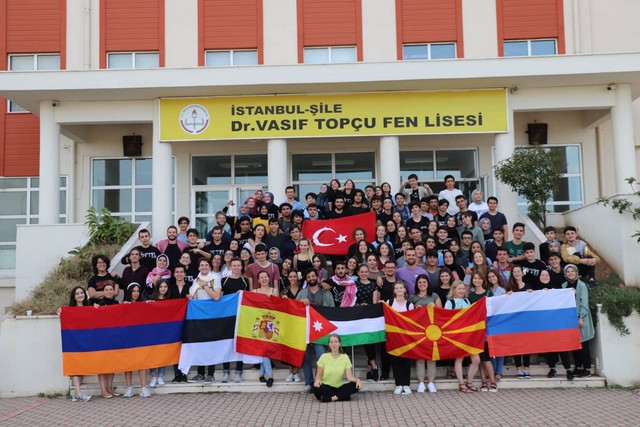Melih, from Turkey, was making a bonfire. Jaradatt, from Jordan, was dancing Jordanian national dances, and Hasan was admiring Lusine’s singing. Nelli from Armenia and Irina from Russia were exchanging recipes for Harisa and Stolichni. Ina from Armenia was telling Ahmad from Jordan about how she got excited over meeting a girl from Kars in Turkish school. Turkish Hamza, Jordanian Majdoleen, and Russian Olya were discussing international relations issues. Armenian Artyom and Macedonian Tome were having a debate over which nation has the best barbecue.
Feeling tired, I decided to sleep a bit. I asked for the key from Paula, my Spanish roommate, and went to sleep. I had only 2 hours to relax, as it was Macedonian and Estonian intercultural night that day. I could not skip it; Macedonian food, drink, Estonian energetic dances… it was very exciting.
I woke up quite excited and was ready to go when I looked at my watch and… 5 in the morning. I initially regretted not being able to attend the intercultural night. But then, I realized that I was alone in my room. I slept so well that I did not hear Paula knocking on the door: where is she?
I was running out of the room in order to find my roommate when I saw Baki and Viki. They were the head organizers of our project, from Turkey and Estonia respectively. They started laughing and then told me that Paula stayed in our Arab friend Salam’s room.
What could ever gather so different nations in one place? Surely, Erasmus+.
Erasmus+ is the EU’s programme to support education, training, youth, and sport in Europe. Its budget provides opportunities for over 4 million Europeans to study, train, and gain experience abroad.
Read also
Erasmus+ is open to many individuals and organisations, although eligibility varies from one action to another and from one country to another.
Eligible countries are divided into two groups: Programme countries and Partners countries. Although Programme countries are eligible for all actions of Erasmus+, Partner countries can only take part in some, and are subject to specific conditions. Armenia is a partner country, but its integrity in such events has increased a lot over the past few years.
Youth exchanges allow groups of young people from different countries to meet, live together, and work on shared projects for short periods.
This takes place outside of the school environment. On a youth exchange, you can expect to participate in activities such as workshops, exercises, debates, role-plays, outdoor activities, and more.
Participants’ learning experiences are recognised through a Youthpass.
First, we were lucky to participate in this project as it gave us an opportunity to discover new cultures, make new friends, and communicate with other nations while studying. The project was held in Turkey. We met participants from Jordan, Spain, Estonia, Macedonia, and Russia. The topic was about culture. We exchanged our national recipes and learned each others’ dances, legends and fairy tales during the program.
The most important outcome of all this is integration. Christian and Muslim brothers, atheist and hijabi sisters, white and black friends: this is what we need the most, this is peace.
We are not against wars: we are for peace. Join us
Mariam Zakaryan
“Aravot” daily
22.10.2019



















































